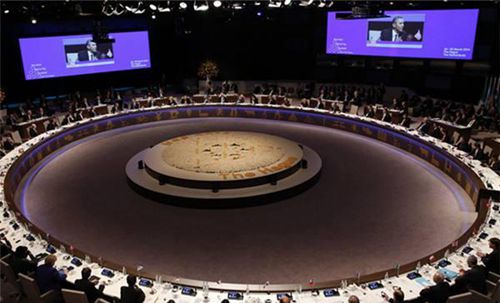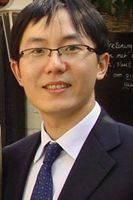By Yu Xiang, visiting scholar at Harvard University, director of the Economics Office at US Research Department under the China Institute of Contemporary International Relations
The 4th Nuclear Security Summit (NSS) will be held in Washington D.C. from March 31 to April 1 with more than 50 world leaders in attendance. This year's summit has attracted much attention, due to recent terrorist attacks in Europe and a nuclear test in the Democratic Repubic of Korea (DPRK).

A serial bombing happened in Brussels, Belgium on March 22, ten days ahead of the summit, which disrupted peace in Europe and had triggered panic across the globe. Public security has been upgraded since the Paris terrorist attack. So, the Brussels attack makes people feel more anxious.
People are worried that unprincipled terrorists might be willing to use radioactive weapons, such as small-scale nuclear bombs, to attack crowds. The Nuclear Security Summit will pay special attention to such issues and call for international cooperation.
In January this year, the United Nations Security Council had imposed sanctions, as unanimously agreed by the five permanent members against the DPRK over its nuclear tests, serving as a warning to the DPRK not to go ahead on nuclear plans.
However, the DPRK had continued to fire ballistic missiles to challenge the international community. How to restrain the DPRK from irrational actions will be a key issue on the summit's agenda.
There will be a bilateral meeting between Chinese President Xi Jinping and US President Barack Obama.
More bilateral and multilateral meetings among the US, Japan, South Korea and Europe are expected to be added to the agenda. Washington has considered a meeting with Beijing as an opportunity to reinforce bilateral talks.
While meeting with visiting Chinese Foreign Minister Wang Yi on February 24, US President Barack Obama said US-China relations is of great importance and both sides should maintain good communication and coordination.
William Tobey, former director of the US Office of Nuclear Energy, Safety and Security (NESS) said, "China plays an essential role in dealing with the problem. China not only has nuclear weapons but also large scale nuclear energy programs bound to expand. And it also has influence on other countries."
It is in accordance with Beijing's interests to enhance cooperation with the international community to eliminate nuclear terrorism and nuclear proliferation.
With China-US joint efforts, a center of excellence (COE) on nuclear security was inaugurated in southwestern Beijing on March 18, one year ahead of schedule. It is the biggest nuclear security exchanges and training center in Asia-Pacific region with the most complete and advanced facilities and equipment. The COE stands as the largest cooperation project jointly financed and built by the Chinese and the U.S. governments in the nuclear sphere. It is an important outcome of the NSS mechanism. Regarding the nuclear issue of the DPRK, Beijing and Washington have common interests and different concerns. China has expressed its stance in support of denuclearization of the Korean Peninsula.
On the joint declaration after a meeting between Condoleezza Rice, US National Security Adviser, and Wang Yi, China's Foreign Minister, neither of the two countries would agree that the DPRK should keep nuclear weapons, and both of them believe that it's important to show a cogent and consolidated international response, including signing an unprecedented UN resolution for sanctions.
DPRK's provocations against US Security Council's resolution constitute challenges to China and the US, but also mean opportunities for them to enhance cooperation. If the situation gets worse and the DPRK took irrational actions, Washington might ask Beijing to endorse tougher sanctions approved by the UN Security Council.
Moreover, the US is likely to speed up its deployment of the THAAD weapon system in South Korea, despite Beijing's repeated objections. Beijing has already taken different measures, intensity and goals on sanctions.
Meanwhile, the US has shown growing interest in the South China Sea. According to the US news media, Beijing's actions are depicted with a military posture that threatens the interests of the US and its allies. A vis-à-vis exchange between state leaders of China and US could dispel misunderstandings.
To shed light on the China-US cooperation, China will hold the G20 Summit this September, the two biggest countries in the world are expected to strengthen negotiations on the agenda to ensure success.
On March 21, the Asian Infrastructure Investment Bank (AIIB) had agreed to provide syndicated loans with the Asian Development Bank (ADB), which lays a good foundation for future cooperation with the AIIB, BRICS Bank, Silk Road Fund, IMF and World Bank.
The syndicated loan program would expand the loan potential of AIIB and control risks, as well as sending a signal to the world, the US in particular, that Beijing’s support for the AIIB would not overturn the current world order, but supplement the international economic system instead.
Cooperation between the AIIB and ADB demonstrates a model for leaders to guide respective teams. Beijing and Washington are likely to enjoy closer cooperation.

Yu Xiang, visiting scholar at Harvard University, director of the Economics Office at US Research Department under the China Institute of Contemporary International Relations
( The opinions expressed here do not necessarily reflect the opinions of Panview or CCTV.com. )

Panview offers an alternative angle on China and the rest of the world through the analyses and opinions of experts. We also welcome outside submissions, so feel free to send in your own editorials to "globalopinion@vip.cntv.cn" for consideration.















